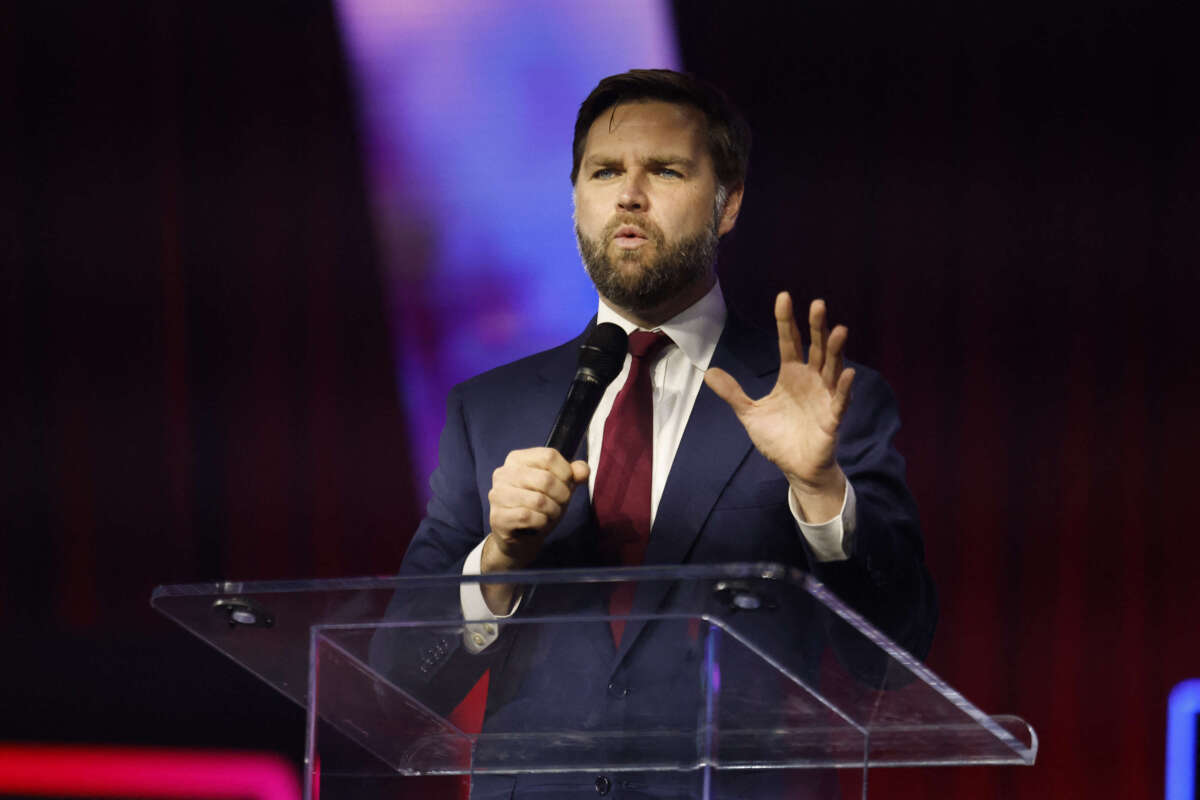Donald Trump announced on Monday that he has chosen J.D. Vance as his running mate for the 2024 election — an opportunistic Republican senator from Ohio with a history of criticizing Trump and promoting white supremacist ideas.
Trump made the announcement ahead of the Republican National Conference in Milwaukee, where he is slated to accept the Republican presidential nomination.
“After lengthy deliberation and thought, and considering the tremendous talents of many others, I have decided that the person best suited to assume the position of Vice President of the United States is Senator J.D. Vance of the Great State of Ohio,” Trump wrote on Truth Social.
Vance, a venture capitalist who regularly cavorts with fascists and racists, was elected to the Senate in 2022 with no previous experience in an elected position. Though he first came to prominence for detailing his working class background in his much-criticized memoir, Hillbilly Elegy, and has positioned himself as a populist, he now bears a close resemblance to the rich elites he publicly disparages.
When he first became a pop culture figure, Vance was known for being a never-Trump conservative who loudly and consistently denounced the former president. When Trump was on the campaign trail in 2016, Vance wrote in a New York Times op-ed that he believed Trump is “unfit for our nation’s highest office” and argued in a Guardian op-ed that Trump was not fit to govern for the white working class. He once said that Trump was akin to “America’s Hitler.”
But, during his bid for Senate, Vance made an opportunistic heel-turn on Trump; after Trump’s election, Republicans adopted a de facto platform of fealty to Trump over any other priority and made it clear that Trump critics were not accepted in the party.
At the same time, Vance made bedfellows with some of the same right-wing extremists the Republican Party has aligned itself with.
After Trump’s dismissive response to the white supremacist rally in Charlottesville, Virginia, in 2017, Vance said that Trump missed an opportunity to criticize the white supremacists and neo-Nazis who attended the rally. But by 2021, Vance’s opinion had shifted: what he once condemned as a white supremacist, neo-Nazi march was now supposedly a “ridiculous race hoax” dreamed up by Democrats wishing to sow division.
Now, he regularly spouts dangerous right-wing rhetoric, vilifying immigrants, defending racism and promoting white supremacist theories. He has also accepted campaign funds from a slew of wealthy donors and industry executives; in the background of Vance’s transformation has been his close relationship with right-wing billionaire Peter Thiel, who has donated extensively to Vance’s campaign and was a major reason for Vance’s victory.
Being Trump’s vice president, however, comes with certain dangers. During the January 6, 2021, Capitol attack, Trump expressed support for calls from the mob of his loyalists to “hang Mike Pence,” as Pence refused to participate in the plan to keep Trump in office after his loss in the 2020 election. Pence, then Trump’s vice president, has said that the incident was a close call.
And, as the attempted assassination of Trump on Saturday reminded the world, the right is increasingly embracing political violence, putting politicians and those who are politically involved in the U.S. in danger; an atmosphere that Vance himself has stoked.
Our most important fundraising appeal of the year
December is the most critical time of year for Truthout, because our nonprofit news is funded almost entirely by individual donations from readers like you. So before you navigate away, we ask that you take just a second to support Truthout with a tax-deductible donation.
This year is a little different. We are up against a far-reaching, wide-scale attack on press freedom coming from the Trump administration. 2025 was a year of frightening censorship, news industry corporate consolidation, and worsening financial conditions for progressive nonprofits across the board.
We can only resist Trump’s agenda by cultivating a strong base of support. The right-wing mediasphere is funded comfortably by billionaire owners and venture capitalist philanthropists. At Truthout, we have you.
We’ve set an ambitious target for our year-end campaign — a goal of $250,000 to keep up our fight against authoritarianism in 2026. Please take a meaningful action in this fight: make a one-time or monthly donation to Truthout before December 31. If you have the means, please dig deep.
